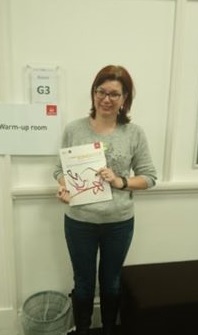
Last week I was sitting alone in a white-washed room trying not to panic and failing. My hands were shaking, my vision was tunneling and any confidence I had was quickly draining away. You can see the fear on my face in the picture above. I was about to take my Grade 1 singing exam and had acute stage fright. In the exam itself I couldn’t breathe properly and forgot the words to a song I’ve known for 20 years. It took every ounce of will to not burst into tears and run out of the room and keep running.
The previous week I was talking at a work conference at double speed while shaking and hyperventilating. I wanted to be sick. I forgot my key points. I felt like an idiot.
Stage fright, or performance anxiety, has been a constant of my adult life. Whether it’s presenting at a conference or singing on my own, once I am aware that the focus of a room will be on me, I begin to shake violently and panic about worst case scenarios. I’m fine if I’m not alone, in a chorus or choir I can sing loudly and confidently. If I have a co-speaker I am fine. It’s the spotlight just on me that terrifies. I’m not sure when it began but I remember a child conflicting emotions of wanting everyone to watch me, and yet dreading letting anyone down. Gradually the fear overcame the confidence.
It’s irrational, but then anxiety is. When faced with stressful situations our cave-person brains assume the worst, we get flooded with stress hormones, and our rational brain shuts down. No amount of logical arguments at this point will work until we can persuade our ancient brain chemistry that the danger has passed.
I’m not alone. Many people suffer from stage fright, including, I was reassured to find out, some very talented people. John Lennon was sick before every concert performance and Stephen Fry, in a move I can deeply empathise with, left the country rather than go on stage.
So what helps? In the week after the disastrous singing exam I’ve been doing some research into what might help. Whilst a certain amount of nerves can enhance performance it’s generally accepted that too much anxiety becomes debilitating. Good quality research into methods of dealing with performance anxiety seems to be lacking but there are plenty of articles, Ted-talks and You-tube videos on the subject. Here are a few of the tips that resonated with me.
- Practice: The more you know something the more confident you’ll feel with your material. I’d add to this by saying that it’s even better if you can practice in your performance or presentation space. One of my big fears is the unexpected and the more I can remove the unknown the safer I feel.
- Breathe: If you focus on long, slow breaths, right down to your belly it physically reduces blood pressure, heart rate, and calms. I should know this. I spend a lot of my working life practicing breathing with women as birth preparation; applying it to myself is trickier.
- Visualise: Rather than imagining what will go wrong, focus on a best case scenario and break the downward spiral. If you do start catastrophisng then make that a more realistic, and therefore lesser, version of the disaster. For example, in my singing exam the worst that would happen was I would fail the exam and have to do it again, not that the world would end.
- Smile: Smiling, or even laughing if you can, releases happier hormones and reduces anxiety. In a presentation or exam it can also help you connect with your audience, to humanise them. If you can convince yourself that you are among friends anxiety should reduce.
Tonight I’m singing in a concert, but with 150 other people. I know that it will be amazing and I will come away buzzing and full of joy. One day I’d like to feel like that after a solo performance of singing or presenting. Until then I’ll keep my focus on not running out the room screaming.
Dear Helen no idea you are so nervous, obviously at choir you come accross as a really cofident and competent performer, if you practice the piece until you can si ng it off copy,and then sing it in front of a few friends, i.e. chamber choir, what’s the worst that could happen, we are all in a similar situation but not obviously as acute as yours, regards Brian
LikeLiked by 1 person
Thanks Brian…😊
LikeLike